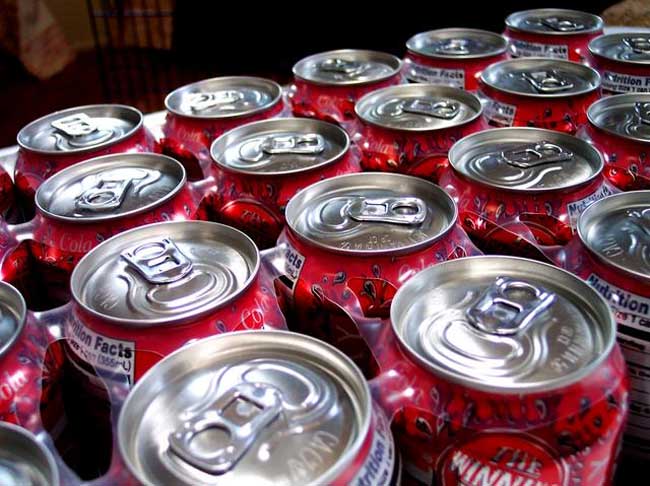Secret to Bad-Tasting Diet Sodas Found

Get the world’s most fascinating discoveries delivered straight to your inbox.
You are now subscribed
Your newsletter sign-up was successful
Want to add more newsletters?

Delivered Daily
Daily Newsletter
Sign up for the latest discoveries, groundbreaking research and fascinating breakthroughs that impact you and the wider world direct to your inbox.

Once a week
Life's Little Mysteries
Feed your curiosity with an exclusive mystery every week, solved with science and delivered direct to your inbox before it's seen anywhere else.

Once a week
How It Works
Sign up to our free science & technology newsletter for your weekly fix of fascinating articles, quick quizzes, amazing images, and more

Delivered daily
Space.com Newsletter
Breaking space news, the latest updates on rocket launches, skywatching events and more!

Once a month
Watch This Space
Sign up to our monthly entertainment newsletter to keep up with all our coverage of the latest sci-fi and space movies, tv shows, games and books.

Once a week
Night Sky This Week
Discover this week's must-see night sky events, moon phases, and stunning astrophotos. Sign up for our skywatching newsletter and explore the universe with us!
Join the club
Get full access to premium articles, exclusive features and a growing list of member rewards.
It's the feel of diet soda in the mouth that makes it taste crummy, not the flavor of the artificial sweetener, studies suggest.
Consumers claim they dislike the taste of aspartame and Splenda, but research by two University of Illinois food scientists shows that swillers of diet and regular soda are also influenced by a subtle factor called mouth-feel.
Mouth-feel refers to a food or beverage's body, fullness and thickness, the scientists say, and the presence of high-fructose corn syrup in regular soda and its absence in diet might be a distinguishing factor for discerning drinkers.
Drink up!
Soo-Yeun Lee and Shelly Schmidt trained 12 people for four weeks to use a 15-point scale to rate the characteristics that contribute to the mouth-feel of diet and regular soda. The panelists became so skilled that they were able to accurately identify significant differences in the mouth-feel of 14 samples that sensitive lab instruments identified as very small.
"We worked with solutions of sucrose and high-fructose corn syrup, asking panelists to detect when beverages began to differ from water in mouth-feel," said sensory scientist Soo-Yeun Lee. "And they were able to accurate identify varying degrees of viscosity on our 15-point scale."
"The human mouth cavity appears to be a super-rheometer (the lab instrument that measures viscosity or thickness)," said Lee's colleague Shelly Schmidt.
Get the world’s most fascinating discoveries delivered straight to your inbox.
Lee, Schmidt and S.M. Kappes, Lee's graduate student at the time, co-authored four studies about the sensory characteristics of diet beverages which were recently published in the Journal of Food Science.
Halo and horns effects
Enjoying food is complex, involving not only taste and mouth-feel, but also aroma, vision and hearing.
"If you bite into an apple and it doesn't crunch, it affects your perception of the way the apple tastes," Lee said. "And if a beverage doesn't feel right in your mouth, that affects your perception of the way the beverage tastes too."
If a food attribute enhances the flavor "sense" that humans have of something eaten, sensory scientists call that a "halo effect." If the attribute diminishes the flavor sense, scientists say it has a horns effect.
When color was added to lemon-lime beverages, panelists believed that the beverage had more body, meaning the color conferred a halo effect. But the color also led tasters to think the beverage had less carbonation, which it did not, meaning the color also conferred a horns effect, Lee said.
"We think the lemon-lime flavor, which is exciting to the mouth, helps mask the mouth-feel difference, and that's why diet lemon-lime drinks were perceived as tasting more like their non-diet counterpoint than cola-flavored drinks," Lee said.
"It's probably also the reason the new lime diet colas are so popular," Lee said. "The sour taste of the lime works with the carbonation to keep the mouth busy so the consumer doesn't notice the lack of body as much."
Seeking a new ingredient
Eventually, the scientists would like to find an ingredient that gives body to diet soft drinks without adding calories or other unpleasant side effects.
"We need to find an ingredient that has no calories but gives the same mouth-feel as sucrose," Lee said.
This ingredient would make diet drinks more appealing. "If we could make diet soda taste better, it would be a big step in fighting the obesity epidemic," Schmidt said. "Many people know they should cut calories, but they won't drink diet pop because they don't like the taste."
 Live Science Plus
Live Science Plus











